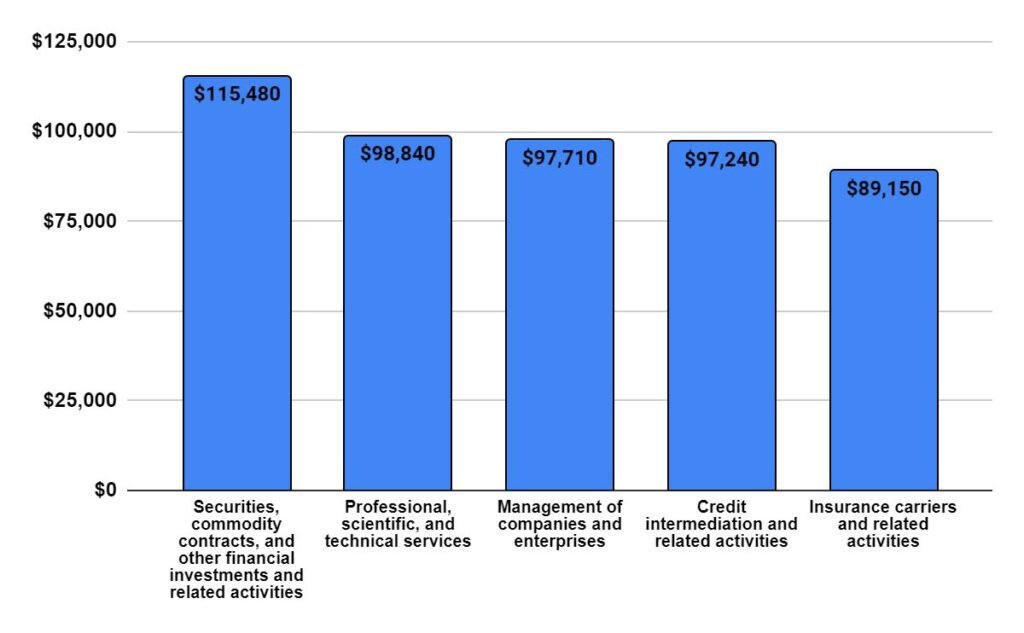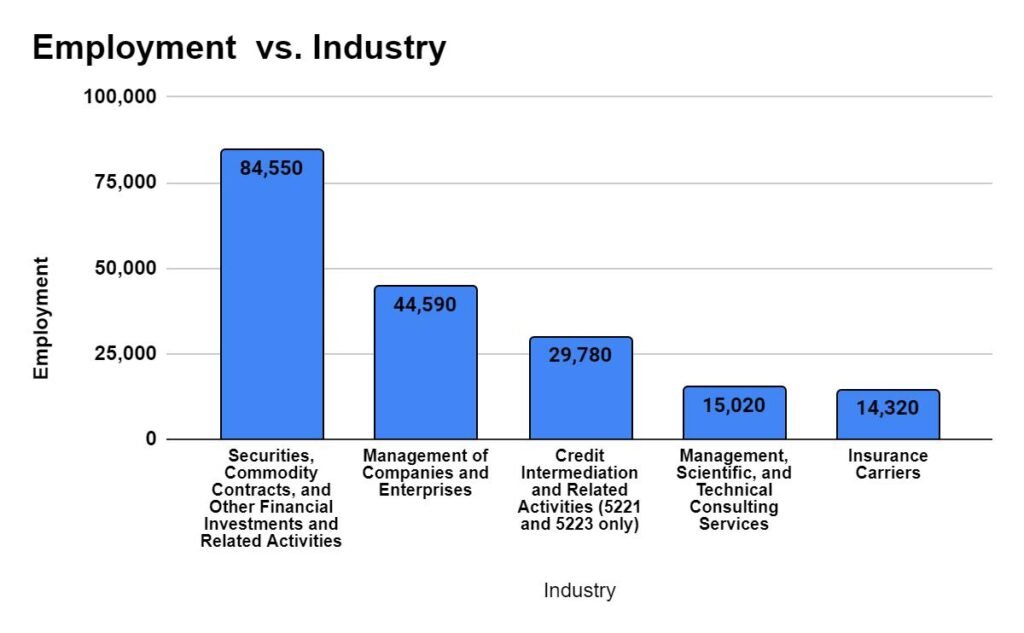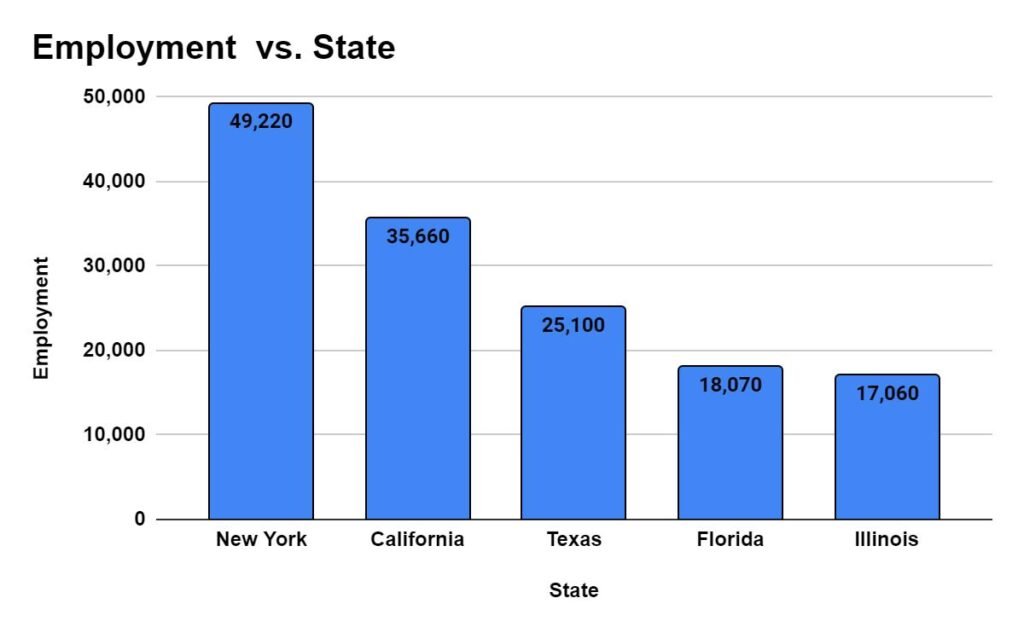Financial and investment analysts are crucial figures in the world of finance, helping businesses and individuals make informed decisions. But how much do they actually earn?
This article explores the salary landscape for financial and investment analysts in the USA, dives into the factors affecting their compensation, and offers tips to boost your earning potential in this field.
Defining the Financial and Investment Analysts :
Financial and investment analysts are professionals who analyze financial data, study market trends, and evaluate investment opportunities to help their clients make informed choices about how to grow and manage their assets.
Here’s a breakdown of their core functions:
Financial Analysts:
- Analyze financial statements (income statements, balance sheets, cash flow statements) to assess a company’s financial health, profitability, and growth potential.
- Evaluate industry trends and economic conditions to understand the broader context impacting a company or investment.
- Build financial models that forecast future performance and risk.
- Generate reports and recommendations for internal stakeholders (e.g., corporate executives) or external clients (e.g., potential investors).
Investment Analysts:
- Research and analyze various investment opportunities, such as stocks, bonds, mutual funds, and real estate.
- Evaluate the risks and potential returns associated with different investment options.
- Recommend investment strategies to clients based on their individual financial goals and risk tolerance.
- Stay updated on market trends, regulatory changes, and new investment products.

- Financial and Investment Analysts Salary: A Spectrum of Opportunity
- Top paying industries for Financial and Investment Analysts
- Top paying States for Financial and Investment Analysts
- Financial and Investment Analysts Take-Home Pay:
- Expenses and Savings Potential
- Beyond the Base Salary
- Factors Affecting Financial and Investment Analysts Income
- Boosting Financial and Investment Analysts Salary: Skills and Tips
Financial and Investment Analysts Salary: A Spectrum of Opportunity
According to the U.S. Bureau of Labor Statistics (May 2023)1, the annual median salary for Financial and Investment Analysts is $99,010. Financial and Investment Analysts earn salaries ranging from $60,830 to $175,840 annually.
Top 10% earners: Exceed $175,840 annually
Bottom 10% earners: Make less than $60,830 annually
Projected annual median salary for Financial and Investment Analysts in 2024-2025 (with 2.5% increase) is $101,485.
The median annual wages for Financial and Investment Analysts in the top industries

Chart 1: Median annual wages for Financial and Investment Analysts in the top Industry (U.S BLS May 20232)
This wide range highlights the diverse factors that influence a Financial and Investment Analysts income. We will be discussing those factors below.
Top paying industries for Financial and Investment Analysts
The data reveals that Financial and Investment Analysts working in Web Search Portals and Other Information Services earn the highest hourly and annual wages, exceeding $ 154,000 annually (U.S BLS)3.
Other high-paying industries include Other Investment Pools and Funds, Accounting and Payroll Services etc.
| Industry | Hourly mean wage | Annual mean wage |
| Web Search Portals, Libraries, Archives, and Other Information Services | $ 74.45 | $ 154,850 |
| Other Investment Pools and Funds | $ 70.50 | $ 146,640 |
| Securities, Commodity Contracts, and Other Financial Investments and Related Activities | $ 67.19 | $ 139,750 |
| Pipeline Transportation of Crude Oil | $ 62.75 | $ 130,520 |
| Accounting, Tax Preparation, Bookkeeping, and Payroll Services | $ 62.40 | $ 129,790 |
Industry with highest Employment Level for Financial and Investment Analysts
Most number of Financial and Investment Analysts are employed in Securities and Other Financial Investments followed by Management of Companies and Enterprises.

Chart 1: Industry with highest employment level for Financial and Investment Analysts
Top paying States for Financial and Investment Analysts
New York leads the pack with the highest annual mean wage for Financial and Investment Analysts. Following closely are Montana and New Jersey all offering wages exceeding 143,000 annually (U.S BLS)4.
| State | Hourly mean wage | Annual mean wage |
| New York | $ 68.91 | $ 143,330 |
| Montana | $ 61.88 | $ 128,720 |
| New Jersey | $ 61.67 | $ 128,280 |
| Massachusetts | $ 61.42 | $ 127,760 |
| California | $ 60.20 | $ 125,220 |
States with the highest employment level for Financial and Investment Analysts
New York leads in providing employment to the Financial and Investment Analysts, followed by California and Texas.

Chart 2: States with the highest employment level for Financial and Investment Analysts
Financial and Investment Analysts Take-Home Pay:
After factoring in federal and state taxes a Financial and Investment Analysts with a state-wise annual mean salary, would have an estimated net income as follows:
Taxes and take home pay estimate for a single filer
New-York: $ 143,330 (Annual mean wage) – $32,397 (Estimated income tax) = $110,933 (Estimated take home pay).
California: $ 125,220 (Annual mean wage) –$28,031 (Estimated income tax) = $97,189 (Estimated take home pay).
Texas: $ 102,590 (Annual mean wage) – $14,830 (Estimated income tax) = $87,760 (Estimated take home pay).
More taxes can be saved by contributions in IRA, retirement, itemized deduction such as charitable contributions, medical and dental expenses.
Expenses and Savings Potential
The average annual expenses for a single person household in New York are estimated at $46,584 excluding taxes, according to estimates from the Massachusetts Institute of Technology5. The figures are measured in 2023 inflation-adjusted dollars.
Based on this estimate, a Financial and Investment Analysts earning the take home pay of $110,933, with basic expenses could potentially save $64,349 annually. It’s important to note that individual expenses can vary significantly depending on lifestyle choices and location.
Savings for Married Couples/Households:
While the data provided doesn’t explicitly detail salary savings for married couples or households, it’s important to consider that combined incomes and potentially shared expenses could significantly increase overall savings potential.
Beyond the Base Salary
Total compensation for Financial and Investment Analysts goes beyond the hourly or annual wage. Organizations offer additional benefits such as:
Housing stipends: To cover the cost of housing during your assignment.
Meal stipends: To help with daily meals.
Travel allowances: To reimburse travel expenses incurred during relocation.
Health insurance: Comprehensive health insurance coverage for you and your dependents.
Paid time off: Vacation days and sick leave.
Childcare assistance: This can help employees afford childcare, which can be a major expense.
Life insurance: This benefit provides financial protection for an employees family in the event of their death.
Disability insurance: This benefit provides income to an employee who is unable to work due to a disability.
Continuing education reimbursement: Support for professional development and training.
Retirement savings plans: These plans, like 401(k)s, allow employees to save money for retirement with tax advantages. Some employers also match employee contributions.
Factors Affecting Financial and Investment Analysts Income
The wide range in the Financial and Investment Analysts salary highlights the diverse factors that influence a Financial and Investment Analyst’s income.
Several factors can affect Financial and Investment Analysts paycheck:
Experience: Like most professions, experience plays a significant role in determining salary. New Financial and Investment Analysts typically earn less than their seasoned counterparts.
Education and Certifications: Many employers prefer to hire analysts with at least a bachelor’s degree in finance, economics, accounting, or a related field. Analysts with advanced degrees, such as a master’s in business administration (MBA) or a chartered financial analyst (CFA) certification, often earn higher salaries.
Skills: Beyond technical knowledge, strong analytical, communication, and problem-solving skills are highly valued assets.
Location: Geographic location significantly impacts Financial and Investment Analysts salaries. States like New York, Montana and New Jersey offer some of the highest pay, while others may offer lower wages.
Job Performance and Reputation: Analysts with a proven track record of successful investment recommendations and strong client relationships are highly valued and can command higher salaries.
Industry and Employer: The industry and type of employer can significantly impact an analyst’s salary. Generally, analysts working in larger financial firms, investment banks, or hedge funds tend to earn higher salaries compared to those employed by smaller companies or in other sectors.
Contract Details: The specific terms of the employment contract, including factors like housing stipends, overtime pay, and benefits, can affect the overall compensation package.
Boosting Financial and Investment Analysts Salary: Skills and Tips
So, how can Financial and Investment Analysts maximize their salary? Here are some tips:
Specialization: Analysts who specialize in specific industries, investment types, or financial products may be able to command higher salaries due to their specialized expertise.
Skills and Certifications: Possessing skills like financial modeling, data analysis, and strong communication can significantly increase your value. Earning relevant certifications like the Chartered Financial Analyst (CFA) designation can also lead to a pay bump.
Negotiate Your Salary: Don’t be afraid to negotiate your salary during the job offer stage. Research market rates for Financial and Investment Analysts with your experience and qualifications.
Network Strategically: Building strong relationships with professionals in the field can open doors to new opportunities and potentially higher-paying positions.
Continue Learning: Stay up-to-date with the latest advancements in your field by Attending industry events, subscribing to relevant publications, and pursuing continuing education can help analysts remain competitive.
Conclusion:
A career as Analysts offers both professional satisfaction and the potential for a high salary. By understanding the various factors that influence salary and carefully managing expenses, Financial and Investment Analysts can make informed decisions and pave the way for a rewarding and financially secure career path.
Share this Post
Financial Risk Specialists Salaries USA 2024: States and Industry
Loan Officer Salaries USA 2024: States and Industry
Accountants and Auditors Salaries USA 2024: States and Industry
The world of accounting offers a stable and rewarding career path. But for aspiring accountants…
Note:
This article provides general information only and should not be considered financial advice: Your individual circumstances and specific job offer details will significantly impact your actual earnings.
Seek professional guidance: Consulting with a financial advisor can provide personalized advice on managing your finances and maximizing your savings potential.
Resources:
- U.S. Bureau of Labor Statistics (May 2023): https://www.bls.gov/oes/current/oes132051.htm#st ↩︎
- U.S BLS May 2023: https://www.bls.gov/ooh/business-and-financial/financial-analysts.htm#tab-5 ↩︎
- U.S. Bureau of Labor Statistics (May 2023): https://www.bls.gov/oes/current/oes132051.htm#st ↩︎
- U.S BLS: https://www.bls.gov/oes/current/oes132051.htm#st ↩︎
- Massachusetts Institute of Technology: https://livingwage.mit.edu/states/36 ↩︎




